


































As the year draws to a close, the technological innovations and trends that defined 2024 are set to gain further momentum, shaping the year ahead. From the continued rise of AI to the transformation of workplaces and cybersecurity landscapes, these trends are expected to consolidate and evolve. The scenario promises more possibilities and challenges for businesses and individuals alike.
AI developments have been relentless and the pace at which further innovations happenwill only quicken, impacting the way we work, communicate, and collaborate. The impact will be felt across industries as customized LLMs get deployed across various use cases. Advanced Applications will deliver transformative solutions in healthcare, finance, retail, and more. Generative AI will have an increasing impact on enabling hyper-personalized customer experiences and accelerating product development cycles.
The hybrid work model continues to evolve with advancements in collaboration tools, virtual meeting platforms, and AI-driven productivity solutions. The integration of AR/VR into workplace tools will further shape remote collaboration.
The year ahead will bring forth more sophisticated cybersecurity challenges and organizations will have no option but to adopt a very proactive cyber resilience strategy. From Zero Trust Architecture to AI driven cybersecurity tools, these approaches will be pivotal in safeguarding against evolving attacks, especially as the IoT and 5G connectivity expand the attack surface.
Sustainability will remain a key driver in technological innovation. Energy-efficient data centres, eco-friendly devices, and AI-driven energy management systems will play a critical role in enabling businesses to achieve environmental goals.
These trends will continue to gain momentum and will push the boundaries of what technology can achieve in an increasingly connected and intelligent world. The onus is with Technology decision makers to drive the adoption of new technologies that will keep their organizations competitive in their respective industries.
RAMAN NARAYAN
Co-Founder & Editor in Chief narayan@leapmediallc.com Mob: +971-55-7802403
Sunil Kumar Designer
R. Narayan Editor in Chief, CXO DX
SAUMYADEEP HALDER
Co-Founder & MD saumyadeep@leapmediallc.com Mob: +971-54-4458401
Nihal Shetty Webmaster
MALLIKA REGO
Co-Founder & Director Client Solutions mallika@leapmediallc.com Mob: +971-50-2489676












Ensuring data security and proper governance in an era where data is the backbone of modern businesses has become more critical.
Cesar Cernuda, the President of NetApp discusses some highlights of NetApp's vision, key initiatives in the Middle East, and their approach to tackling industry challenges like sustainability and data security.

Rob McGreevy, CPO at Aveva discusses how Aveva is helping the energy sector navigate the path towards a more sustainable future.
Sustainable IT and AV solutions, are quickly emerging as a critical component of corporate responsibility writes Ekta Puthran, Head of Sales APAC & MEA - Collaboration, Barco.
Hyther Nizam, President, Zoho MEA discusses how they are investing in partnerships with local organisations.

Whether applications or APIs, traditional, modern, or AI applications, programmability is a key tool in the security toolbox for dealing with security issues, writes Lori MacVittie, F5 Distinguished Engineer.





Companies to co develop native AI Agents using NVIDIA NIM Agent Blueprints within the ServiceNow platform

Bill McDermott Chairman and CEO, ServiceNow
ServiceNow, the AI platform for business transformation has announced a major expansion to its strategic partnership with NVIDIA to accelerate enterprise adoption of Agentic AI. The companies will use NVIDIA NIM Agent Blueprints to co develop native AI Agents within the ServiceNow platform, creating use cases fueled by business knowledge that customers simply choose to turn on.
NVIDIA will collaborate with ServiceNow to map out multiple AI agent use cases. With six years of joint innovation on AI models, ServiceNow and NVIDIA are reshaping how businesses integrate AI into their operations.
The Now Platform is rapidly becoming a foundation for enterprise transformation in the evolving landscape of generative AI. By harnessing NVIDIA's advanced AI infrastructure — such as the NVIDIA
AI Enterprise software platform, including the NVIDIA NeMo framework and NVIDIA NIM microservices running on NVIDIA DGX Cloud, and ServiceNow’s leading AI platform for business transformation, this partnership is supercharging productivity and streamlining complex workflows across industries.
“GenAI is a massive tailwind for our industry, and ServiceNow and NVIDIA are bringing the next wave of agentic AI to enterprises everywhere,” said ServiceNow Chairman and CEO Bill McDermott. “The transformative potential of AI is unfolding for enterprises in real time. CEOs are looking to ServiceNow and NVIDIA to modernize their businesses and lead them into an AI powered future. Together, our world class product and engineering teams are shoulder to shoulder, putting AI to work for our customers.”
Reinforces commitment to Saudi Arabia’s Vision for AI and Digital Transformation
NetApp has announced the opening of its Middle East regional headquarters in Riyadh, Saudi Arabia, to be officially functional on February 1, 2025. This strategic move underscores NetApp's dedication to supporting Saudi Arabia’s Vision 2030 and beyond, fostering innovation, and investing in the Kingdom's technology ecosystem. As Saudi Arabia drives its transformation into a global hub for AI and digital innovation, NetApp’s Intelligent Data Infrastructure will play a crucial role.
On his first visit to the Kingdom, George Kurian, Chief Executive Officer of NetApp, said, “Saudi Arabia is leading a technological transformation, and NetApp is proud to be an integral part of this journey. By establishing our headquarters in Riyadh, we reaffirm our commitment to investing in local talent, empowering businesses, and supporting the Kingdom’s goal of building an AI-driven economy. At
NetApp, we are dedicated to providing the infrastructure that enables our customers in the Kingdom to scale and innovate.”
NetApp’s investment in Saudi Arabia reflects its global strength as a leading data infrastructure company, with 13,000 employees and an annual revenue of $6.27 billion in FY24. Having served Saudi Arabia since 2007, NetApp supports customers in major public sector, utilities, telecoms, and energy, among others. NetApp’s regional headquarters in Riyadh which will be fully operational in February 2025, will enable the company to support better the Kingdom’s growing demand for advanced AI and data analytics solutions and reaffirm the company's long-term commitment to the Kingdom.

George Kurian CEO, NetApp
“Saudi Arabia’s rapid pace of modernization, coupled with its deep technical knowledge at the leadership level, makes the Kingdom a prime market for technology adoption. Businesses here are eager to implement cutting-edge AI and digital government services, positioning the country to lead in the region’s technological future,” added Kurian.
Finesse will offer Identity & Access Management (IAM) offerings from Saviynt
Finesse Cyberhub, a leading MSSP and a 24x7 CSOC in the region has forged a strategic partnership with Saviynt, a leading provider of cloud-native identity and governance platform solutions, to elevate its Identity and Access Management (IAM) offerings. This collaboration enables Finesse to incorporate Saviynt's cutting-edge identity security platform, The Identity Cloud, into their extensive IAM suite, guaranteeing that their clients benefit from the latest advancements in identity governance technology.
As organizations grapple with the complexities of managing digital identities, this partnership allows Finesse and Saviynt to jointly offer an advanced solution that complements the existing IAM services. Saviynt's Identity Cloud platform delivers identity governance and administration (IGA), application access governance (AAG), external identity governance, and privileged access management (PAM) in a single solution, ensuring that clients can govern and manage identities and their access effectively. Saviynt helps ensure digital identities have the right access to the right assets at the right time. Saviynt capabilities not only enhance security but also streamline regulatory compliance making them invaluable as organizations continue to transform; With Saviynt , digital identities will have:
● Enhanced security and risk management

● Regulatory compliance
● Operation efficiency
● Enhanced return of Investment (ROI)
Mohammed Amin President, CEEMETA, Dell Technologies
"Our collaboration with Saviynt is a game-changer for our IAM capabilities. In the new era of AI and continuous governance requirements we intend to build possibilities for customers with a secure identity platform, " said Eljo J P ,CBO & Director of Finesse.
New solution combines observability into connected devices configured with Intel Thunderbolt and Intel Wi-Fi technologies

Riverbed has announced Riverbed Aternity for Intel Thunderbolt and Wi-Fi—a new solution that for the first time combines observability into connected devices configured with Intel Thunderbolt and Intel Wi-Fi technologies. The solution combines Aternity’s advanced analytics and powerful visibility into user experience with the Intel Connectivity Analytics software development kit (SDK) that provides below-the-OS telemetry for devices with
Intel Thunderbolt and Wi-Fi technologies. The solution extends visibility beyond the PC or laptop, enabling IT teams to deliver a better digital experience for end users.
Powered by Intel Connectivity Analytics, the observability solution for Intel Thunderbolt and Wi-Fi technologies is the first third-party module available as part of the Riverbed Unified Agent, which enables organizations to confront agent fatigue challenges by allowing IT teams to capture more data without the need to add more agents.
“I'm thrilled to announce the next chapter in Riverbed’s partnership with Intel,” said Dave Donatelli, CEO of Riverbed. “We’re unveiling a first-of-its-kind solution to expand observability beyond the PC into connected devices with Intel Thunderbolt and Wi-Fi technologies, providing IT teams with new levels of visibility across the device ecosystem that will enhance digital experiences for millions of employees. With this innovation, we’re addressing the “black box” effect where IT is left guessing and relying on manual troubleshooting.”
This partnership aligns with e& UAE’s commitment to becoming the premier managed services provider in the UAE
e& UAE, the telecoms arm of e& in the UAE, has announced a significant partnership with Hewlett Packard Enterprise (HPE), a leading provider for edge-tocloud solutions. This collaboration marks a pivotal step in e& UAE’s ambitious business-to-business (B2B) journey.
As e& UAE continues to establish a variety of strategic partnerships, this latest alliance with HPE is set to fortify the company's position in the market, taking another step forward in developing a comprehensive managed service portfolio that responds to market trends and propels it toward embracing emerging technologies. This partnership aligns with e& UAE’s commitment to becoming the premier managed services provider in the UAE and the region, as it focuses on delivering optimal business and technology outcomes for customers from key sectors, including Government, Education and
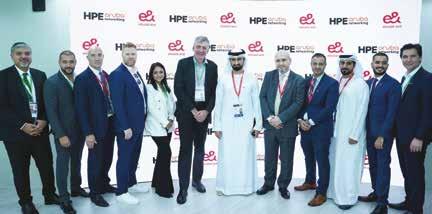
Hospitality while addressing key challenges. To cater to the evolving demands of these sectors, HPE and e& UAE will offer tailored networking solutions and comprehensive services, based on HPE Aruba Networking technology.
Hamad Al Marzooqi, Senior Vice Presi-
dent of Presales and Business Operations, e& UAE, remarked, "This partnership with HPE Aruba Networking is a testament to our dedication to transform and lead in the technology sphere. This collaboration will undoubtedly enhance our service offerings and reinforce our commitment to excellence."
This partnership will equip channel partners to capitalize on the growing market for all-flash storage.

Redington announced that it has become a certified distributor within the Pure Storage distributor program. Redington will now provide the Pure Storage all-flash, sustainable data storage platform to its customers in the Middle East and Africa region.
This collaboration empowers regional customers to overcome critical data management challenges. By joining the Pure
Storage distributor program, Redington and its channel ecosystem will deliver a unified data platform to customers across the region, enabling them to drive business agility, optimize performance, and accelerate digital transformation.
Pure Storage solutions support customers with a more resilient, efficient, and sustainable data infrastructure. The all-flash
platform helps meet customer needs including: the ability to scale up and down with an SLA driven as-a-Service model to support organisations growing data volumes and need for flexibility. In addition, Redington will deliver Pure Storage’s advanced data protection features, and disaster recovery capabilities to support business continuity. Customers also demand simplified management and sustainable solutions which Redington can provide with the Pure Storage platform.
Redington will collaborate closely with its channel partners to provide in-depth product training, technical support, go-to-market resources, and certification programs, enabling them to support customers’ goals with Pure Storage solutions. This partnership will equip channel partners to capitalize on the growing market for all-flash storage.
Cloudera Copilot for Cloudera AI accelerates productivity, enhances collaboration, and supports continuous learning

Dipto Chakravarty Chief Product Officer, Cloudera
Cloudera, the hybrid platform for data, analytics, and AI, recently announced the launch of Cloudera Copilot for Cloudera AI, introducing secure and intelligent assistant capabilities that help to supercharge productivity and streamline data workflows. Built to meet the needs of data scientists, engineers, and developers, Cloudera Copilot improves reproducibility across projects, ultimately helping to enable enterprises to get trusted data, analytics, and AI applications into production faster than ever.
Data practitioners face an increasingly complex web of productivity, collaboration, and duplication challenges. AI assistants overcome these challenges by enhancing the user experience for data practitioners while providing IT leaders seeking secure AI-enhanced tools
for peace of mind. By embedding an AI-powered assistant directly into Cloudera, Cloudera Copilot helps users write high-quality, consistent code and focus on innovation more effectively and securely.
Cloudera Copilot operates within an AI ecosystem, delivering robust, AI-driven coding assistance while also providing on-demand support.
“Cloudera is continuously modernising our AI solutions to give our customers deeper access to data-driven insights at scale,” said Dipto Chakravarty, Chief Product Officer at Cloudera. “Today, Cloudera provides one of the fastest routes to achieving trusted AI initiatives, and Cloudera Copilot further accelerates enterprise’s ability to derive business value from their data via actionable insight.
Partnership to accelerate large-scale AI cloud services innovation
Pure Storage and CoreWeave, the AI Hyperscaler, have announced Pure Storage’s strategic investment in CoreWeave to accelerate AI cloud services innovation. Alongside the investment, the companies unveiled a strategic partnership, enabling customers to leverage the Pure Storage platform within CoreWeave Cloud.
Building on their shared success with some of the world’s most advanced AI companies, this collaboration helps to fuel the next generation of AI innovators, driving breakthroughs with CoreWeave’s cloud services and the Pure Storage platform. By adding Pure Storage as a partner, CoreWeave recognises Pure Storage’s 15 years of innovation in flash technologies and its proven track record with some of the world’s top AI companies.
“Our strategic collaboration with CoreWeave reflects a shared commitment to delivering AI innovation at scale and
marks a major milestone in delivering the flexibility and scalability that AI-driven organisations need to thrive. Integrating the Pure Storage platform into CoreWeave’s specialised cloud service environments enables customers that require massive scale and flexibility in their infrastructure the ability to tailor their infrastructure and maximise performance on their own terms,” said Rob Lee, Chief Technology Officer, Pure Storage.
The Pure Storage platform is now available as an option within CoreWeave’s dedicated environments, which customers access through the CoreWeave Platform, a no compromise engineering solution purpose-built for some of the world’s most compute intensive workloads. The CoreWeave Platform uses automation to simplify complexity, maximising infrastructure performance and efficiency, while Pure Storage offers a highly scalable, efficient storage solution, with joint solu-

Rob Lee Chief Technology Officer, Pure Storage
tions already deployed in production at supercomputing scale across thousands of GPUs. Together, they empower customers to accelerate their time to market.
By integrating ML into Google Cloud’s cutting-edge capabilities, Endava will work with organisations in these segments to solve complex business issues
Following a year of impressive growth in the MENA region, Endava, a leading provider of next-generation technology services, today announced the establishment of a dedicated Google Cloud practice in the region. As a fully certified Google Cloud Partner, Endava is now strongly positioned to enable MENA enterprises — particularly those in Saudi Arabia and the UAE — to efficiently process, analyse, and derive valuable insights from their data at scale.
The newly established division will be spearheaded by Andrew Rossiter, the company’s Global Lead for this practice. Having now been relocated to the region, Rossiter will primarily divide his time between Saudi Arabia and the UAE. Commenting on the positioning of a global lead in-region, which signals Endava’s deep commitment to its local custom-
ers, David Boast, Managing DirectorMENA, Endava, said, “Untethered by legacy infrastructure investments, enterprises in the Middle East are actively pioneering the future of AI. Google Cloud plays a pivotal role in this journey, providing the powerful AI and data capabilities that enable organisations to unlock actionable insights and scale intelligently. The establishment of this unit in the region follows our ‘close-to-customer’ approach, which enables us to work as a seamless extension of their team, delivering rapid and impactful outcomes.”
At launch, the new unit will focus on finance, insurance, healthcare, and smart city projects, where cloud scalability and AI integration can drive rapid innovation and operational efficiency. These are also industries that are strategically significant to the national visions of Saudi Arabia,

the UAE, and other MENA nations. By integrating Machine Learning (ML) into Google Cloud’s cutting-edge capabilities, Endava will work with organisations in these segments to solve complex business issues.
The partnership underscores the companies' shared vision of elevating cybersecurity standards in the region

Mindfire Technologies, one of the largest Managed Security Service Providers (MSSP) in the Middle East, has announced its strengthened collaboration with LevelBlue, a leading provider of managed network security services, managed detection and response, strategic consulting, and threat intelligence.
LevelBlue works closely with global MSSPs, MSPs, Value-Added Resellers (VARs), and system integrators to meet the heightened security needs of today’s customers, while adhering to evolving compliance and reporting requirements. Mindfire Technologies, known for its exceptional market presence and expertise, delivers top-tier cybersecurity services to organizations of all sizes. Through their collaborative efforts, LevelBlue and Mindfire are delivering cutting-edge threat detection, incident response, and
cloud security solutions to enhance cybersecurity resilience.
“Our relationship with LevelBlue has enabled us to deliver advanced cybersecurity technologies to some of the most prominent organizations in the Middle East,” said Rejeesh Kumar, CTO of Mindfire Technologies. “Together, we are addressing the cybersecurity challenges of today and preparing for the threats of tomorrow.”
“Mindfire Technologies has been instrumental in helping us expand our footprint within the Middle East,” said Ajay Paul, Account Manager, MSSP Specialist for LevelBlue. “Their deep understanding of local market needs combined with our world-class cybersecurity solutions has allowed us to make significant strides in securing digital transformation efforts across this region.”
With AI-driven routers and a clear vision for software-centric solutions, D-Link is helping drive towards a smarter, more connected world.
D-Link is consolidating its transition from hardware-focused innovations to software-driven advancements. With decades of experience delivering reliable routers, switches, and networking equipment, D-Link embraced a transformative vision: integrating Artificial Intelligence (AI) into its offerings over the past couple of years and more.
Since its inception, D-Link has been synonymous with high-performance and durable networking hardware, catering to the needs of homes and businesses alike. Its robust product portfolio has established it as a trusted name in the industry. However, as technological advancements continue to reshape the networking landscape, the company recognized the need to evolve. The global shift towards software-defined solutions and AI-powered technologies presented an opportunity to redefine its approach and meet modern demands.
D-Link’s AI-enabled routers leverage advanced machine learning algorithms to deliver smarter, more adaptive performance. Key features include:
1. Real-Time Network Optimization
By analyzing network traffic patterns, the AI router prioritizes bandwidth allocation for critical applications like video conferencing, gaming, or streaming. This ensures a seamless user experience by minimizing lag

and buffering.
2. Proactive Security Measures
Equipped with intelligent threat detection, the router identifies and mitigates cybersecurity risks in real time. It proactively patches vulnerabilities, enhancing network security without user intervention.
3. Energy Efficiency
The software-centric design significantly reduces energy consumption. By dynamically managing power usage for connected devices, the router supports sustainability goals while maintaining optimal performance.
4. Personalized User Experience
AI integration enables the router to learn user behaviors and preferences, offering tailored recommendations for device management, parental controls, and network settings.
D-Link continues to showcase its commitment to innovation and its readiness to lead the industry towards a software-defined future. By moving away from static, hardware-reliant systems, D-Link offers customers a flexible, scalable, and future-proof networking solution.
This shift not only enhances user experiences but also establishes D-Link as a thought leader in the tech industry. The focus on software-defined networking (SDN) positions the company at the forefront of technological advancements, inspiring peers to invest in similar innovations.
As AI becomes integral to networking solutions, D-Link’s transformation reflects its forward-thinking approach. This move aligns with the growing demand for smarter, more efficient networks—driven by the proliferation of Internet of Things (IoT) devices and the increasing adoption of smart home technologies. While hardware will remain a key component of the networking ecosystem, D-Link’s focus on AI and software innovation ensures its offerings stay relevant in an ever-evolving market.
D-Link’s transformation signifies more than a shift in product strategy; it marks a reimagining of the company’s role in shaping the future of connectivity. By emphasizing scalability, efficiency, and user-centric design, D-Link is setting a benchmark for performance and intelligence in the networking domain.
“D-Link’s transformation from a hardware-centric manufacturer to a software-driven AI innovator reflects a bold step towards the future of connectivity. With our AI router, D-Link had set a benchmark for performance, intelligence, and user-centric design,” said Sakkeer Husain, Director of Sales and Marketing at D-Link Middle East and Africa. “Such innovations not only secures the company's place at the forefront of technological evolution but also redefines the possibilities of networking in the AI age.”
Nutanix Enterprise AI provides an easy-to-use, unified generative AI experience on-premises, at the edge and now in public clouds

Thomas Cornely SVP, Product Management, Nutanix
Nutanix, a leader in hybrid multicloud computing, announced that it extended the company's AI infrastructure platform with a new cloud native offering, Nutanix Enterprise AI (NAI), that can be deployed on any Kubernetes platform, at the edge, in core data centers and on public cloud services like AWS EKS, Azure AKS, and Google GKE. The NAI offering delivers a consistent hybrid multicloud operating model for accelerated AI workloads, enabling organizations to leverage their models and data in a secure location of their choice while improving return on investment (ROI). Leveraging NVIDIA NIM for optimized performance of foundation models, Nutanix Enterprise AI helps organizations securely deploy, run and scale inference endpoints for large language models (LLMs) to support the deployment of generative AI (GenAI) applications in minutes, not days or weeks.
Generative AI is an inherently hybrid workload, with new applications often built in the public cloud, fine-tuning of models using private data occurring on-premises, and inferencing deployed closest to the business logic, which could be at the edge, on-premises or in the public cloud. This distributed hybrid GenAI workflow can present challenges for organizations concerned about complexity, data privacy, security, and cost.
Nutanix Enterprise AI provides a consistent multicloud operating model and a simple way to securely deploy, scale and run LLMs with NVIDIA NIM optimized inference microservices as well as open foundation models from Hugging Face. This enables customers to stand up enterprise GenAI infrastructure with the resiliency, day 2 operations, and security they require for business-critical applications, on-premises or on AWS Elastic Kubernetes Service (EKS), Azure Managed Kubernetes Service (AKS), and Google Kubernetes Engine (GKE).
Additionally, Nutanix Enterprise AI delivers a transparent and predictable pricing model based on infrastructure resources, which is important for customers looking to maximize ROI from their GenAI investments. This is in contrast to hard-topredict usage or token-based pricing.
Nutanix Enterprise AI is a component of Nutanix GPT-in-a-Box 2.0. GPT-in-a-Box also includes Nutanix Cloud Infrastructure, Nutanix Kubernetes Platform and Nutanix Unified Storage along with services to support customer configuration and sizing needs for on-premises training and inferencing. For customers looking to deploy in public cloud, Nutanix Enterprise AI can be deployed in any Kubernetes environment but is operationally consistent with on-premises deployments.
“With Nutanix Enterprise AI, we're helping our customers simply and securely run GenAI applications on-premises or in public clouds. Nutanix Enterprise AI can run on any Kubernetes platform and allows their AI applications to run in their secure location, with a predictable cost model,” said Thomas Cornely, SVP, Product Management, Nutanix.
Nutanix Enterprise AI can be deployed with the NVIDIA full-stack AI platform and is validated with the NVIDIA AI Enterprise software platform, including NVIDIA NIM, a set of easy-to-use microservices designed for secure, reliable deployment of high-performance AI model inferencing. Nutanix-GPT-in-a-Box is also an NVIDIA-Certified System, also ensuring reliability of performance.
"Generative AI workloads are inherently hybrid, with training, customization, and inference occurring across public clouds, on-premises systems, and edge locations," said Justin Boitano, vice president of enterprise AI at NVIDIA. "Integrating NVIDIA NIM into Nutanix Enterprise AI provides a consistent multicloud model with secure APIs, enabling customers to deploy AI across diverse environments with the high performance and security needed."
Key use cases for customers leveraging Nutanix Enterprise AI include: enhancing customer experience with GenAI through analysis of customer feedback and documents; accelerating code and content creation by leveraging co-pilots and intelligent document processing; leveraging fine-tuning models on domain-specific data to accelerate code and content generation; strengthening security, including leveraging AI models for fraud detection, threat detection, alert enrichment, and automatic policy creation; and improving analytics by leveraging fine-tuned models on private data.

Updated all-flash storage offerings drive performance at all budgets and offer simplicity at scale
NetApp, the intelligent data infrastructure company announced updates to its portfolio of enterprise storage offerings including new NetApp AFF A-Series and AFF C-Series systems with midrange, all-flash, unified data storage at price points for businesses of any size and updates to NetApp StorageGRID, driving improved density and performance for object storage.
With these new innovations, customers can now expand their intelligent data infrastructure using NetApp’s leading data storage systems at more accessible entry points, making it easier to scale up from a smaller starting point or expand their capabilities to remote and branch locations. These new systems enable customers to power the growing scope of critical workloads, such as database applications and AI, or tap into the efficiency of all-flash storage to manage the growing volumes of data under their control. By leveraging intelligent data infrastructure that delivers performance, capacity, and a unified framework, customers can make their data a strategic asset that enables more informed decision-making and drives innovation.
NetApp is making the storage that turbocharges mission-critical workloads available to every customer by releasing additional models for its AFF A-Series storage systems. Like the high-end AFF
models, the new NetApp AFF A20, A30, and A50 models deliver advanced capabilities including sub-millisecond latency with up to 2.5X better performance over their predecessors, guaranteed storage efficiency, integrated real-time ransomware protection with 99+ percent accuracy, and improved storage density, all at an affordable price-point.
Customers can build or expand their intelligent data infrastructure for high-performance workloads with storage deployments at the scale and price point that works best for them. For customers who want to start small and grow or build out deployments in remote or branch locations, the AFF A20 starts at a capacity point as low as 15.35TB. The AFF A30 allows customers to start small but scale to over 1PB of raw storage. And the AFF A50 delivers two times the performance of its predecessor in a third of the rack space to power commercial and enterprise businesses.
New NetApp AFF C-Series systems are designed to deliver more value for general purpose workloads and workload consolidation across unified file, block, and object storage protocols by delivering maximum density and efficiency with seamless scaling. The NetApp AFF C30, C60, and C80 systems make the performance and efficiency gains of flash more accessible to businesses by providing an industry-leading 1.5PB of storage capacity in
two-rack deployments. Customers modernizing their data centers from hybrid flash will experience benefits including up to a 95 percent floor space savings, power savings up to 97 percent, and built-in real-time ransomware protection with 99+ percent accuracy, lowering their total cost of ownership.
“The unrelenting growth of data volumes and increasingly demanding workloads have put increasing pressure on IT teams of any size to provide simplicity at scale for all their workloads,” said Sandeep Singh, Senior Vice President and General Manager of Enterprise Storage at NetApp. “Customers facing those challenges can rely on NetApp to deliver continuous innovation, illustrated by the release of the new more powerful, intelligent, and secure NetApp AFF A-Series systems and the new scalable, efficient, and secure NetApp AFF C-Series systems. Today, we are making our latest developments in intelligent data infrastructure more accessible for an even wider range of customers.”
Both the AFF A-Series and C-Series systems are powered by NetApp ONTAP, delivering simplicity at scale for NetApp customers by leveraging intelligent data infrastructure to power mission-critical apps, run general-purpose workloads, and tier data to lower-cost FAS systems all with the same streamlined operational and protection models.
Data security is today a fundamental pillar of organizational integrity. Organizations are faced with the dual challenges of ensuring data security and compliance with the ever-evolving regulations.
This underlines the criticality of adopting robust data governance frameworks and approaches like Zero Trust Architecture to mitigate risks and enhance resilience.
Data governance is no longer a luxury; it is necessary for organizations seeking to thrive in a data-driven world.
Mohammed Feroz Khan, Head of IT Security, Compliance & Projects, TotalEnergies EP Qatar says, “Effective data governance helps organizations protect sensitive information, maintain data integrity, and make informed decisions. Without a robust data governance framework, organizations may face significant risks, including data breaches, regulatory penalties, and loss of customer trust.”
According to Sunil Kumar Nair, CISO at McCoin Virtual Asset, “Data governance is vital to ensure the integrity, security, and compliance of financial data, which underpins trust in blockchain and crypto systems. It supports accurate decision-making, regulatory compliance, and protection against data breaches, safeguarding customer confidence and operational efficiency.”
Key elements of effective data governance include data classification, encryption, access controls, and adherence to regulations such as GDPR and AML/KYC. These components collectively establish a framework that ensures data is managed responsibly and ethically throughout its lifecycle.
Imran Kannuti, Head of Ops Digitalization and Transformation at Banque MISR,

Ensuring data security and proper governance in an era where data is the backbone of modern businesses has never been more critical.
mentions, “Data policies and procedures, data stewardship, access control, and encryption are essential for protecting data assets and enabling data-driven decision-making. Effective governance provides the foundation for compliance and operational success.”
The shift to hybrid work models has added layers of complexity to data security. Employees working from diverse locations and using various devices create vulnerabilities that cybercriminals are eager to exploit.
Mohammed Feroz says, “Ensuring data security and privacy in a distributed work environment requires a multi-faceted approach. Secure communication channels, VPNs, and strong password policies are fundamental.”
He adds further that Businesses must invest in endpoint security and provide regular training to employees on data protection best practices.
“Additionally, businesses should invest in endpoint security solutions and provide regular training on data protection best practices to employees. Monitoring and managing access controls also play a vital role in safeguarding sensitive information. It is crucial for organizations to continuously evaluate and update their security measures to address emerging threats and vulnerabilities.”
Ensuring data security and privacy when employees work from multiple locations is crucial.
Imran says, “Some of the strategies to be considered as implement work-only systems, use VPN and Antivirus Software,
provide cybersecurity training, enforce strong access controls, data encryption & create a dedicated workspace. By implementing these strategies, businesses can significantly enhance their data security and privacy, even when employees are working remotely.”
Comprehensive frameworks that incorporate robust authentication methods such as multi-factor authentication (MFA), endpoint protection tools, and real-time threat monitoring are pivotal.
Sunil points out, “Secure collaboration tools with end-to-end encryption, alongside secure Wi-Fi and firewalls, create a resilient framework for remote operations. Regular updates to security measures are essential to address emerging threats.”
According to Muhammed Irfan Ali, Head of Information Technology & Security at CAFU, “Organizations should implement strong access controls, including multi-factor authentication (MFA) and role-based permissions, alongside secure endpoints with encryption and anti-malware tools. Data should be encrypted in transit and at rest, with automated backups and regularly tested. Network security measures like VPNs, firewalls, and secure Wi-Fi are essential, as is real-time threat monitoring with Security Information and Event Management (SIEM) tools."
He also adds that regular software updates, employee security training, and compliance with regulations are critical. Further, leveraging cloud security solutions, zero trust architecture, and AI-driven threat detection strengthens defences against potential breaches.
Insider threats remain one of the most insidious risks to organizational data security. Whether intentional or accidental, insider misuse of data can result in severe financial and reputational damage. Addressing these risks requires a combination of policies, technology, training, and a culture of accountability.
“At McCoin Virtual Assets, we tackle insider risks by integrating technological safeguards and fostering a culture of security,” explains Sunil Kumar Nair. “Data Leak Prevention (DLP) systems monitor
and prevent unauthorized data transfers, while strict access controls and regular audits ensure compliance. Encouraging transparency and ethical behavior within the organization is also vital.”
Imran Kannuti opines that conducting regular employee training on cybersecurity, phishing awareness, and insider threat education helps employees understand their role in protecting data.
He adds, “Monitoring tools that detect unusual behavior further mitigate risks, while clear incident response plans ensure swift resolution when incidents occur.”
According to Feroze Khan tackling insider risks requires a combination of preventive and detective measures.
He elaborates, “Conducting thorough background checks during the hiring process and promoting a culture of transparency and accountability are essential. Implementing strict access controls and monitoring user activity can help detect and prevent unauthorized data access. Regularly reviewing and updating security policies, along with providing ongoing education on data security, can further mitigate insider threats. Encouraging employees to report suspicious activities and fostering a sense of collective responsibility can also contribute to minimizing insider risks.”
Cloud technologies have revolutionized data governance by offering scalable, secure, and efficient solutions for managing vast amounts of data.
Mohammed Feroz says, “Cloud technologies play a significant role in modern data governance strategies by providing scalable storage solutions, advanced security features, and real-time data access. They facilitate automated data management, ensuring consistency and accuracy. Moreover, cloud platforms offer robust tools for monitoring and auditing data usage, which is essential for compliance and risk management. The integration of cloud technologies into data governance strategies enables organizations to efficiently manage large volumes of data while maintaining high levels of security and compliance.”

Platforms like AWS, Azure, and Google Cloud provide tools that enhance data governance strategies through encryption, role-based permissions, and compliance certifications.
Imran says, “Cloud technologies play a pivotal role in modern data governance strategies by providing scalable, secure, and efficient solutions for managing data. Cloud technologies provide scalability and flexibility, enhanced security, data integration and interoperability, cost efficiency & disaster recovery and business continuity. By leveraging these capabilities, organizations can enhance their data governance strategies, ensuring that data is managed securely, efficiently, and in compliance with regulatory requirements.”
Muhammed Irfan says that cloud technologies, like AWS, Azure, and Google Cloud, are vital for modern data governance, enabling centralized management, scalability, and advanced security.
He adds, “They support compliance with regulations such as GDPR and HIPAA while ensuring secure data access and control through encryption and role-based permissions. Cloud platforms also foster global collaboration, offering cost-effec-



tive, scalable solutions for managing diverse datasets. With compliance tools and certifications, they simplify adherence to regulations, empowering organizations to unlock data's potential while maintaining transparency, security, and control in a dynamic landscape.”
As cyber threats grow in sophistication, traditional perimeter-based security models are proving inadequate. Zero Trust Architecture (ZTA) has emerged as a game-changer, fundamentally redefining how organizations protect sensitive data.
Mohammed Feroz underscores its significance: “Zero Trust operates on the principle of ‘never trust, always verify,’ continuously authenticating and authorizing users and devices.”
ZTA enforces least privilege access, encrypts data in transit and at rest, and employs dynamic policies to adapt to evolving threats. “By minimizing attack surfaces and enhancing compliance with regulations like GDPR and HIPAA, Zero Trust strengthens organizational resilience,” explains Muhammed Irfan. “It enhances visibility and safeguards sensitive information, whether in transit or at rest.”
Efficiently managing data access for hybrid teams requires a multi-layered approach. “Organizations should implement strong access controls, including rolebased permissions and MFA,” advises Imran Kannuti. “Secure endpoints with encryption and anti-malware tools, alongside automated backups, further enhance data integrity.”
Sunil says that centralized identity and access management (IAM) systems ensure that only authorized personnel can access specific data based on their roles, reducing risks of unauthorized access.
“Implementing multi-factor authentication (MFA) adds an extra layer of security, while Zero Trust principles continuously verify user identities and devices before granting access. Secure collaboration tools with end-to-end encryption facilitate seamless teamwork without compromising data integrity. Regular training and audits further ensure that both employees and systems adhere to security protocols, supporting a safe and productive hybrid work environment,” adds Sunil.
The integration of AI and automation into
data management practices is reshaping how organizations approach governance. AI-powered tools analyze data for patterns and anomalies, enabling proactive risk management. Automation simplifies data classification, tagging, and archiving, ensuring consistency and compliance.
“AI-driven tools provide real-time insights into data usage and compliance,” remarks Mohammed Feroz . “By reducing human errors and streamlining processes, they enhance operational efficiency and decision-making.”
The importance of robust data security and governance cannot be overstated in today’s digital-first world. Whether through Zero Trust Architecture, cloud technologies, or AI-driven solutions, organizations must adopt a proactive, multi-layered approach to safeguarding sensitive information.
As Sunil Kumar Nair aptly remarks, data security is not just a technical requirement but rather it is the foundation of trust, compliance, and organizational resilience. By prioritizing data governance and leveraging innovative technologies, businesses can navigate the complexities of modern data landscapes with confidence.




Cesar Cernuda, the President of NetApp discusses some highlights of NetApp's vision, key initiatives in the Middle East, and their approach to tackling industry challenges like sustainability and data security.
Can you provide a broad overview of NetApp’s operations and growth in the region?
NetApp is a company with over 30 years in the market, approximately 13,000 employees, and a presence in more than 100 countries worldwide. We’re proud to be a global company with a strong local presence.
In the Middle East, we have been active for over 20 years. We opened our office in Dubai Internet City in 2001, making us one of the pioneers in the region. Today, we have around 50 employees in the UAE and work with 36 dedicated partners across various industries and verticals. Our approach has always been to empower our partners to drive growth locally.
The storage and data management market has undergone
significant shifts. How has NetApp adapted its product roadmap to meet these changes?
More than adapting to the changes, we’ve been leading them. Over the years, we’ve seen technology trends evolve—from the internet to digital transformation, to cloud, and now AI. The common thread across these shifts is data. Our commitment has been to enable customers to access and leverage their data wherever it resides. While many of our competitors hesitated to embrace the public cloud, we made a strategic decision to partner with the largest hyperscalers: Microsoft, AWS, and Google. Today, NetApp technology is embedded natively in their consoles, not just available in marketplaces. This unique differentiation allows our customers to seamlessly move workloads between on-premises and cloud environments, ensuring flexibility and scalability.
How is NetApp adopting AI in its solutions focus?
AI is fundamentally about algorithms and data. While algorithms are important, the quality and accessibility of data are critical. Even the best algorithms will produce poor results if the data is flawed. This is where NetApp’s intelligent data infrastructure comes into play.
We support customers in building AI-ready infrastructures that integrate seamlessly across hybrid cloud environments. By enabling interoperability and ensuring data is accessible, secure, and managed efficiently, we empower organizations to harness their data’s full potential.
What are the common challenges organizations face when implementing intelligent data infrastructure?
One of the biggest challenges is security. Customers want to embrace AI but are concerned about protecting their data. At NetApp, we offer ransomware protection and data recovery solutions, backed by years of expertise in cybersecurity.
Another challenge is the complexity of integrating data from various sources and environments. Through our BlueXP technology, we provide a unified control pane for data management, regardless of whether it’s in the cloud, on-premises, or in hybrid environments. This simplicity is key to enabling intelligent data infrastructure.
Can you elaborate on your partnerships with hyperscalers like AWS and Google for edge deployments?
Our collaborations with hyperscalers, including AWS Outposts and Google Distributed Cloud, highlight the trust they place in NetApp’s technology. These partnerships enable data management at the edge, addressing specific use cases like AI environments and distributed workloads.
For example, our recent partnership with Google for AI solutions demonstrates how we’re working together to serve customers. While I can’t disclose all the details, these collaborations reflect our commitment to building ecosystems that support customers in their journey from cloud adoption to AI.
How does customer feedback influence your product design?
Customer feedback is central to our innovation process. Through tools like Active IQ, we monitor how customers use our technology, allowing us to make real-time adjustments and improvements. Additionally, our support and customer success teams provide insights into evolving customer needs.
At the same time, we’re proactive in driving innovation. For instance, our focus on intelligent data infrastructure addresses the growing demand for AI-ready environments, enabling customers to leverage their data securely and efficiently.
Keystone Storage as a Service is a significant offering. What are the typical customer profiles for this product?
Keystone offers customers the power of choice. Whether they prefer managed services through a third party, self-managed solutions, or fully outsourced options, Keystone adapts to their needs.

Our technology is also integrated into hyperscalers, enabling customers to consume storage as a service directly through partners like AWS and Google. In the Middle East, Keystone has seen significant adoption, growing at 150% annually.
Sustainability and energy efficiency are major concerns. How does NetApp address these in its roadmap?
Sustainability is integral to our strategy. By modernizing data centers with our latest technology, customers can significantly reduce energy and water consumption. Our high-performance and high-capacity flash solutions, along with our ESG initiatives, help organizations meet their sustainability goals.
In Europe, where sustainability requirements are particularly stringent, we’ve seen an increasing demand for ESG-compliant solutions. Our annual ESG reports reflect our commitment to these values, embedding them into our technology and operations.
What is key to NetApp’s approach towards enabling customers?
Our mission is to support customers throughout their journey, whether it’s transitioning to the cloud, embracing AI, or optimizing their data infrastructure. Through our technology, partnerships, and customer-centric approach, we aim to empower organizations to achieve their goals without compromising on security, flexibility, or sustainability.
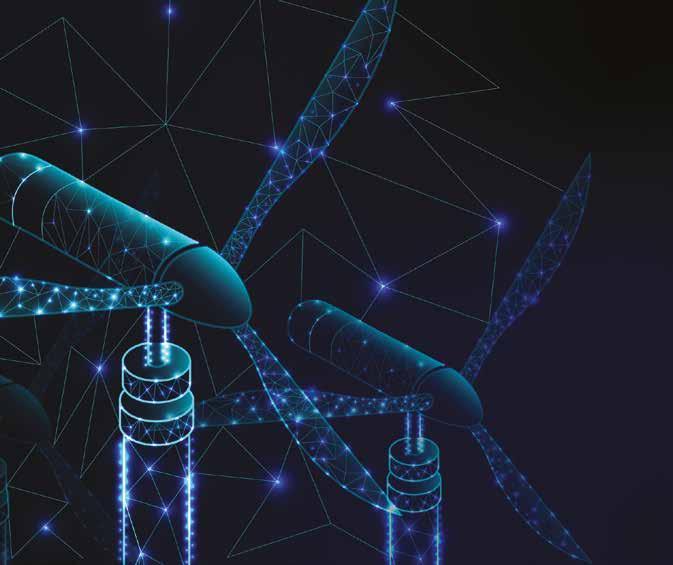
Rob McGreevy, CPO at Aveva discusses the company's strategic direction, the role of emerging technologies like AI, and how Aveva is helping the energy sector navigate the path towards a more sustainable future.
Discuss Aveva's current direction and focus areas?
Aveva continues to be an independent, neutral software player in the industrial manufacturing and critical infrastructure markets. We've been innovating in this space for over 50 years, and that will continue as part of our partnership with Schneider Electric. This is a great opportunity to improve alignment with the electrification of the world and collectively drive more sustainable outcomes across our combined customer base.
Our mission, vision and core capabilities remain unchanged. We are focused on serving the industrial and oil and gas sectors, helping them achieve their net zero goals through the use of our technologies, particularly in areas like AI and digitalization of the value chain.
Can you share some recent advancements in Aveva's solutions that are helping to drive sustainability goals?
One of the key areas we've been focused on is the application of generative AI, particularly in the use of large language models. We've been infusing AI across the design, build, operate and optimize lifecycle of our portfolio.
For example, in the design phase, we can use generative AI to automatically generate optimal pipe routing, leading to significant productivity gains. In operations and maintenance, we've used predictive and prescriptive analytics to optimize processes like steam production, resulting in substantial reductions in CO2 emissions and water consumption.
We've also developed an industrial AI assistant that leverages language models to facilitate conversations with operators, providing them with real-time access to information and guidance. This helps empower the workforce and improve overall efficiency.
How do you go about discovering and developing these AI-powered use cases?
It's a collaborative process that involves both direct customer interactions and our partner ecosystem. We work closely with our customers to understand their challenges and pain points, and then explore how our technologies, including AI, can be applied to solve those problems.
We also leverage our extensive partner network, which includes technology partners, system integrators, and industry experts. This ecosystem helps us identify new use cases and quantify the value that can be achieved through the application of our solutions.
Events like ADIPEC are particularly valuable for us, as they allow us to connect with customers and partners, share our latest developments, and gather insights to inform our future roadmap.
Can you tell us more about the industrial AI assistant introduced at ADIPEC?
The industrial AI assistant is a unique solution that we've developed to help facilitate conversations and provide trusted information to operators and other industrial workers. It uses language models to interact with users, but importantly, it interfaces directly with the industrial systems and data sources to ensure the accuracy and reliability of the information provided.
The assistant can answer questions, provide guidance, and even help users access relevant documentation and diagrams. What sets it apart is the way we've integrated it with the underlying industrial systems, providing citations and links to the source data, so users can verify the information.
We believe it can have a significant impact across all the industries we serve, not just the energy sector. It's a great example of how AI can be applied in a safe and sustainable way to empower the industrial workforce of the future.
How receptive do you think the energy industry is to the adoption of AI and open standards?
The energy industry, like many industrial sectors, tends to be more conservative and cautious when it comes to adopting new technologies. This is understandable, given the critical nature of the systems and processes involved.
However, we've seen a shift in mindset since the COVID-19 pandemic, which forced the industry to explore new technologies and ways of working. There is now a greater openness to exploring the potential of AI and other digital solutions.
The key is demonstrating the clear value that these technologies can bring, whether it's reducing energy consumption, improving productivity, or enhancing safety and sustainability. The industry is less concerned about the technology itself and more focused on the tangible benefits it can deliver.
Change management is certainly a consideration, but we're seeing increasing receptiveness to AI and open standards as the industry recognizes the need to adapt and transform to meet the challenges of the future.
Can you share any insights into Aveva's future roadmap and the technology releases you have planned?
Aveva has a long history of innovation, and we continue to invest heavily in our core product areas, as well as developing new and exciting technologies.
In the short term, you can expect to see continued enhancements to our design engineering, automation, controls, and reliability maintenance solutions. We're also placing a strong emphasis on visualization, which will allow users to view and optimize their entire industrial value chain through different lenses, such as capital projects, production, and sustainability.
On the AI front, you'll see us further integrating generative AI and other advanced analytics capabilities across our portfolio. This will drive improvements in areas like design, predictive maintenance, and workforce training and productivity.
Overall, our focus is on empowering our customers to achieve their operational, sustainability, and digital transformation goals through the power of our innovative technologies. ADIPEC will be a great platform for us to showcase some of these exciting developments.

A carefully curated agenda featuring keynotes and panel discussions from industry experts, provided actionable insights into transformative trends shaping the future of work at the 4th UAE edition of the Future Workspace Summit & Awards.
The 4th Annual UAE edition of the Future Workspace Summit & Awards took place on November 28, 2024, at the JW Marriott Dubai Marina, bringing together a distinguished audience of IT leaders and decision-makers from prominent UAE enterprises.
The event’s agenda featured a dynamic mix of keynotes and panel discussions led by industry and technology experts, shedding light on cutting-edge trends and solutions transforming the future of work. With hybrid work and work-from-anywhere models now firmly established across global organizations, the discussions emphasized the role of emerging collaboration technologies and AI in driving innovation, enhancing productivity, and reimagining workplace engagement.
True to its reputation, the summit delivered an interactive and insightful platform, highlighting transformative technological advancements that continue to shape the way businesses operate and evolve in today’s fast-paced digital landscape.
In addition, the day celebrated the outstanding achievements of individuals who have been pivotal in driving IT transformation and companies leading the way with their innovative solutions. The day began with Khurram Hassan, Director of the Abu Dhabi Autonomous Racing League (A2RL), delivering an insightful keynote on the League. He illuminated the League’s achievements and the upcoming second edition, scheduled for April 26, 2025, at Yas Marina Circuit.
Charbel Zreiby, Regional Director, Channel Specialists - CEEMETA at Dell Technologies, followed with an engaging session on “Empowering an AI-Driven Future,” highlighting transformative AI solutions. Ms. Ekta Puthran, Head of Sales & Regional Marketing for Asia Pacific & Middle East Africa at Barco, explored advancements in workplace technologies with her keynote titled “Taking Meeting Room Technologies to the Next Level.”
Wassim Abi Saab, Regional Alliances and UAE Channel Manager at Pure Storage, shared insights on “Leading the Way to the
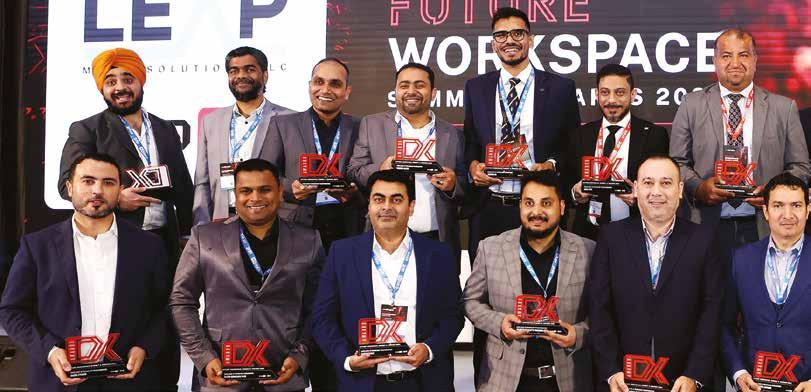

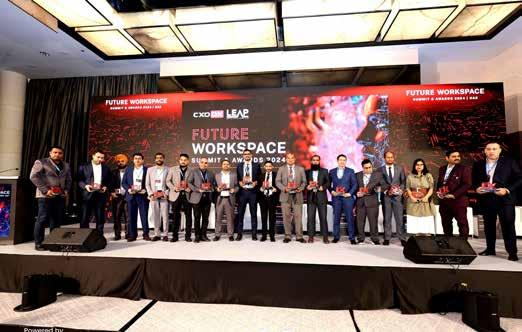


Next Era of Data.” Shreyas Nandennavar, Head of Channel Partnerships for MENA at Freshworks, focused on “Leveraging AI and Automation with Freshworks to Boost Employee and Customer Experience” in his address.
Gary Wootton, Commercial Account Manager at Mimecast, addressed strategies to enhance cybersecurity awareness through “Mimecast Engage: Human Risk-Powered Awareness & Training.” Malay Upadhyay, Senior Sales Engineer - Enterprise at Sophos, outlined practical steps in “Achieving Better Cybersecurity Outcomes with Sophos.”
Rejeesh Kumar, CTO of Mindfire Technologies, provided a compelling discussion on “Adding a Risk-Based Approach to Evaluating Cybersecurity,” emphasiz-

ing the importance of contextual risk assessment in today’s evolving threat landscape.
Finally, Ajay Biyani, Vice President – APMEA, Securonix presented on AI-Reinforced CyberOps.
The first panel discussion of the day focused on Streamlining Collaboration Environment in the Hybrid Workplace, highlighting actionable insights for enabling collaborative ecosystems in the evolving hybrid workplace.
The participants in this session were Moderator: Siddharth Biswakarma, Deputy General Manager, Aster DM Healthcare
Panelists:
1. Damir Jaksic, Chief Information Officer, KEO International Consultants
2. Ali Katkhada, Group Chief Information Officer, Depa Group
3. Shafik Nasser, Chief Information Officer, SABER
4. Loubna Imenchal, VP / Head of Enterprise Business video collaboration AMECA Africa Middle East Turkey Central Asia, Logitech
5. Rajesh Ranganathan, Regional Manager for Business Solutions, Zoho
The next panel discussion debated various aspects of ‘Operationalizing and Governing Generative AI in the Enterprise’. The session covered the opportunities of deploying Gen AI and challenges including managing risks and creating governance frameworks that align with organizational goals and regulatory requirements.

The session was moderated by Walid Salem, IT Lead-Applications and Development, Zurich Insurance company Ltd.
The panelists were:
1. Dr. Jassim Al Awadhi, Senior Director, Du
2. Amna Al Dhaheri, Head of Digital Transformation, Transport Authority, Ajman
3. Waqas Butt, Group Head Of ICT & AI, Alpha Dhabi Holding
4. Afroz Walile, Vice President Strategy Transformation , First Abu Dhabi Bank (FAB)
5. Anchal Choubey, Group-Head of IT Leading Financial Services MENA
Data Strategies and Governance for the Hybrid Workplace was the focus of the next session where the participants ex-

plored how businesses can manage growing data ecosystems, reduce risk, and enable decentralized workforce productivity. Alok Tuteja, President of the board of Directors, ISACA UAE Chapter, moderated the session.
The panelists were:
1. Faisal Khan, Associate Director-Information Security & Compliance, Dubai World Trade centre
2. M. Irfan Ali,Head of Information Technology & Security, CAFU
3. Hessa Almatrooshi, Team Leader-Information Security, Ajman Free Zone
4. Zaheer Kazi, Enterprise Security Specialist, Ministry of Interior
5. Dr. Lenish Kannan, Chief Information Officer, Western International Group


6. Jishant Karunakaran, CEO of Mindfire Technologies
Following this, the next session focused on how Artificial Intelligence (AI) is redefining the domains of Customer Experience (CX) and Employee Experience (EX). Mina Rizk (Moderator) Regional Head of Operations, Telecommunicate Outsourcing moderated the session.
The panelists were:
1. Jayanth Ananthakrishnan, Head of Digital Transformation, Gulf International Bank
2. Mai Momani, Head of Client Experience, Invest Bank P.S.C
3. Sagarika Nayak, Director-Customer Success & VOC, GMG


4. Kowshik Bhattacharjee, Head of Service Excellence, Medcare Hospitals & Medical Centres
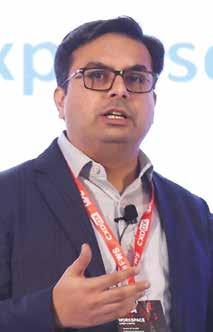
The final panel discussion of the day focused on the topic ‘Cybersecurity in the Era of Gen AI and Hybrid Workplace’.
1. Kapil Matta, Governance Risk Compliance Manager, Agthia Group moderated the session. The panelists were:
2. Dr. Hossam elshernraki, professor, Dubai Police Academy
3. Vijay Velayutham, Principal Information Security Officer, MOEIUAE
4. Adam Lalani, IT Director, Alliad
5. Gaurav Manaktala, Group Head IT, RAK hospital
6. Sunil Paul, MD, Finesse
7. Gary Wootton, Commercial Account Manager, Mimecast

The first Awards segment in the morning recognized outstanding IT leaders from several leading enterprises operating in the UAE across the categories Excellence in Technology Acceleration ( for IT Managers and related profiles) as well as Excellence in Technology Transformation ( for senior IT Managers and related profiles) .
The evening awards segment included recognitions in categories including Excellence in CIO Leadership, Excellence in CISO Leadership, and Workspace Transformation of the Year, as well as award recognitions for vendors, partners, and Sales and Marketing leaders from the region’s Technology industry.
The event’s Gold sponsors included Microsoft with Logicom, Logitech with Alpha Data, Barco with FVC, ZOHO, Freshworks, Sophos, D-Link, Mimecast with Bulwark Technologies, Securonix, Mindfire Technologies, Pure Storage with Tahaluf and Starlink.
The silver sponsors of the day included

Cloud Box Technologies, Finesse, ManageEngine, TalentonLease, Asbis, Paessler with Securenet. The Knowledge partner of the day was ISACA.

Ekta Puthran Head of Sales APAC & MEA –Collaboration, Barco

Mohammed Rizwan Razeek Al Matroushi Group
Muhammed Zawahir Two Seasons Hotels
Sajin Salim Abu Dhabi University
Sheffin KS Durham School Dubai
Shane Nicholas ABB Industries LLC
Abdul Azeem Baqar Mohammed Emirates Float Glass
Mohsen AlOjel MIDSTAR
Sabu SK ENPI Group
Mohamad Hicham Alrayis AIRSSIST
'Excellence
Bader Zyouud Abu Dhabi Media Network
Ahmed AlQassab EITC (DU)
Saeed Chishti DXBE
Kashif Rasheed Union Coop
Hossam Nabil ElShenraky dubai police academy
Mahin Rasheed Sunset Hospitality Group
Mohammed Rahman Mecheri Apparel Group
Waseem Anwar Alfahim Group
Shameer CT HOTPACK GLOBAL
Fahim Syed Prime Healthcare Group
Noufal Moideen Thumbay Group
Jasmita Malik Majid Al Futtaim
Mahesh Kumar GALADARI BROTHERS
Shajai VK AMMT
Sujith Kunhambu Nair Nesto (WIG)
Shabeer Muhammad Ali Aban Investment LLC
Rehman Ghani Brothers Gas
Hussien Gad AG Holding
Gagandeep Singh Hoda Al Dahra
Zeeshan Haider Jafry Unique Group
Haziq Humayun Blue LLC
Ahtasham Sadiq VLCC Group
Afra Mohammed Almansoori Digital Dubai
Pradeep Kumar The Aquilla Schools
Majid Khan Ajman Bank
Eyad Kashkash Department of Culture and Tourism
Latifa Alshehhi Ministry of Investment
Rahul Shah Jubaili Bros
Yousif Odeh Emirates Driving Institute
Nayaz Ahamed Metal Park
Imran Kannuti Banque Misr UAE
Shafahath Ashraf UNIQUE GROUP
Jaison Sebastian Foodfund Investment LLC
Ajay Mathai Kerzner International
Mohammed Faisal Idais LALS Group
Akhilesh Tiwari Blurock projects Management Services
Kelly Machado webK Digital Consulting
Tabran Ahmed Truebell Group
Aslam Abdul Kader Gulftainer Company Limited
Vimal Rama Chandran
HLB HAMT
Raza Mustafa Al Ansari Hospitality
Suhail Shaikh
McDermott International
Moza Al Dahak Creative media authority
Swapnil Kadam
Aster Hospitals UAE
Ali Hasan Alhammadi
DGE Gov Talent
Dr. Jassim Al Awadhi
EITC - du
Tamara Nasr Akhras
AMSI
Walid Salem
Zurich Insurance Company
Mohammad Abdulwahid Al Ajmani
SHARJAH CUSTOMS
Shabeer Mangattu Parambil
Abu Dhabi University
Khodarahm Khoshrou
CBE
Siddharth Biswakarma
Aster DM Healthcare
Zaheer Kazi Ministry of Interior
Jayanth Ananthakrishnan
Gulf International Bank
‘Excellence
Saleh Shahrestani Metal Park
Dr. Lenish Kannan Western International Group - Nesto/Geepas
Leonid Dorogoy
HI Management Services
Ali Katkhada
Depa United Group PJSC
Aiman Othman Union Coop
Dr. Shijin Prasad
Cure Medical Centers & Pharmacies, AL Nokhba Medical Center
Mina Rizk
Telecommunicate Outsourcing
Mai Momani
Invest Bank P.S.C
Sagarika Nayak
GMG
Arun Tewary
Alpine Group
Afroz Walile
First Abu Dhabi Bank
Kowshik Bhattacharjee
Medcare Hospitals & Medical Centres
Alok Tuteja
Group Head of Governance Risk and Compliance (confidential)
Joseph Aninias
Abu Dhabi University
Bassem Al-Wazir
NFPC
Satheshwaran Manoharan
ADQ Aviation and Aerospace
Seif Aldin Abdulkarim
Amina Health Group
Mustansir Aziz
Automech Group
Shon Philip Concorde Corodex Group
Abdulrahman Khaiwi
Emirates National Schools
Sergio Rodriguez Barron Almarki Group
Ahmed Al Madani ENOC
Sajith Pillai
Millennium Place Marina
Anish Mohamed
Lulu Group
Karthikeyan Gurusamy
Truebell Group of Companies
Rabih Merhy Jewel Of the creek hotels
Bahaa Hijaz Sharjah Islamic Bank
Sageer NK GM IT
Adam Lalani Alliad
Mohit Duggar Millennium Place Barsha Heights Hotel and Apartments
Salem Bajaba Binladin Contracting Group
Ali Al Jasmi Khalifa Fund
Anchal Choubey Leading Financial Services
Waqas Butt
Alpha Dhabi Holding
Salahuddin Almohammadi HSA Group
Rahul Cheruvelly Emirates Hospitals Group LLC
Mohammed Hussain Danube Group
Aliakbar Patwa
Arabian Gulf Steel Industries LLC
Ali Chehade CFI Group
Syed Ashar Ahmed Bloom Holding
Shabil Pushkaran Azco Realestate Brokers LLC
Mohamed Arshad Kuthubdeen Alserkal Group
Vishal Salot Bukhatir Group
Gautam Anand
Easa Saleh Al Gurg
Ahmed Shawky Millenium Hotels and resorts
Mubarak Aljabri Mbzuh
Riasat Ali A Government Entity
Jinson Pappachan
Emirates Policy Center
Eng. Isha Aljasmi Minister of Energy & Infrastructure
Jaleel Rahiman Prime Healthcare Group
Meshal Abdulla Binhussain Ministry of Finance
Jiju GS S.S Lootah Group
Gaurav Manaktala Rak Hospital- Arabian Healthcare Group
H.E. Dr. Mubaraka Ibrahim Emirates Health Services
Nithin Geo Thomas Amity Education Middle East
Younis Othman Dubai Customs
Damir Jaksic KEO International Consultants
Anish T Varughese Skelmore Group
Khaqan Shaheen MIR Plastic Industries
Manoj Bhojwani ADIB
Abdul Hameed Pharmatrade
Jacob Mathew Government Entity
Amna Saleh Al Dhaheri Transport Authority - Ajman
Aliasgar Bohari Zulekha hospital
Ali Jumaily Sharaf Group
Byju Philip ME Dubai
Shafik Nasser Horizon Terminals LTD
Hesham Abdullah Khalifa University
Abdulazez Alamim National Library and Archives UAE
Abdalla Al Ali organization name is DMCC
Abhilash Radhadevi OQ Trading
Abhinav Kumar NMC
Binesh Balan Gulftainer
Chenthil Kumar Red Sea International
Eng. Eissa Naser Al Hammadi Department of Health, Abudhabi
Faisal Khan
Dubai World Trade Centre
Kausar Mukeri Gems Education
Khalil Al-Mukhalalati Department of Culture and Tourism- Abu Dhabi
Manoharan Mudaliar Truebell Group of Companies
Mohammed Riyasudeen Al Ain Ahlia Insurance Co (PSC)
Mohannad Hennawi NAFFCO
Muhammad Irfan Ali CAFU
Mukesh Kumar Apparel UAE
Nasser Alneyadi Ministry of Interior
Sultan Al Mansoori Abu Dhabi Media
Sunil Kumar Nair McCoin Virtual Assets LLC
Tony Varghese
Sharjah Digital Department
Vijay Velayutham Ministry of Energy and Infrastructure
Dubai Customs
AERZEN
Transport Authority - Ajman
RAK Ports
BFL Group
Abu Dhabi Islamic Bank
CBE
Aster Hospitals UAE
Vikalp Shrivastava Kerzner international
Vinoth Inbasekaran
Dubai Government Entity
Mohammed Feroz Khan
Total Energies
Saqar Al Ali Sharjah Finance Department
Ramadan Mohamad Ali Transport Authority - Ajman Government
Waqar Anjum SHUAA Capital psc
Hessa Almatrooshi Ajman Free Zone
Kapil Matta Agthia Group
Vishnu Chinnaraj Government Sector (confidential)

Dell Technologies
AI Infrastructure Solutions Vendor of the Year
HPE Aruba
Edge Networking Vendor of the Year
Huawei
Cloud Infrastructure Vendor of the Year
Zoho
Business Productivity Solutions Vendor of the Year
Logitech
Collaboration Hardware Vendor of the Year
Freshworks
EX Solutions Vendor of the Year
Pure Storage
AI-Powered Storage Solutions Vendor of the Year
Securonix
SOC Solutions Vendor of the Year
Manage Engine
IT Operations Management Vendor of the Year
Crowdstrike
Threat Intelligence Vendor of the Year
Zscaler
Zero Trust Security Solutions Vendor of the Year
Veeam
Cloud Data Management Vendor of the Year
Secureworks
MDR Vendor of the Year
Nexthink
Digital Workplace Solutions Vendor of the Year
D-Link
Cloud Networking Vendor of the Year
Paessler
Enterprise Monitoring Solutions Vendor of the Year
Sophos Endpoint Security Vendor of the Year
Mimecast
Email Security Vendor of the Year
Barco
Meeting Rooms Solutions Vendor of the Year
Lexar
Flash Storage Vendor of the Year
Toshiba Hard Drives Vendor of the Year
Logicom
Digital Transformation Distributor of the Year
Starlink
Data Solutions VAD of the Year
Ingram Micro
Cloud Marketplace of the Year
Redington
Analytics and AI Solutions VAD of the Year
Thierry Nicault
Bulwark Technologies
Area VP & GM, Salesforce ME
Cybersecurity Distributor of the Year
FVC
Collaboration Solutions VAD of the Year
Securenet
Fast Growing VAD of the Year
ASBIS Distributor of the Year
TFG
Data Center Solutions VAD of the Year Distributor
MBUZZ Technologies
Components Distributor of the Year
Almoe
AV Solutions VAD of the Year
Finesse
Digital Transformation SI of the Year
Cloud Box Technologies
Cloud Solutions SI of the Year
Mindfire Technologies MSSP of the Year
Tahaluf Big Data and Analytics SI of the Year
Alpha Data AV Solutions SI of the Year
Ben McDonald Marketing Leader of the Year
Charbel Zreiby
Technology Evangelist of the Year
Ekta Putran
Woman Channel Sales Leader of the Year
Kamlesh lal
Channel Marketing Manager of the Year
Kiara Israni
Excellence in Digital marketing
Maya Zakhour Woman Channel Executive of the Year
Radwa Hassan Exellence in Channel Communications
Rania Al Khatib Excellence in Marketing Execution
Rima Ben Salah Excellence in Channel Management
Sakkeer Hussain Vendor Executive of the Year
Sanchari Roy Excellence in Channel Marketing
Sirin Akrouk Marketing Innovator of the Year
Suresh Venkataraman Excellence in Channel Enablement
Max Matveev
Excellence in Marketing Leadership
Medhavi Kakkar Excellence in Marketing Initiatives
Mohamed Nishad Excellence in Channel Enablement
Riddhi AnilKumar Excellence in Channel Support
Shaed Khader Excellence in Partner Management
Sonali Basu Roy Excellence in Channel Marketing
Vasu Sharma Excellence in Marketing Execution
Eljo J Pynadath Excellence in Business Growth
Jishant Karunakaran Cybersecurity Visionary of the Year
Goher Ali Rizwi Excellence in Marketing Execution
Hyther Nizam, President of Middle East and Africa, Zoho discusses how they are investing in partnerships with local organisations and enabling businesses of all sizes realise the benefits of digital technologies

What are some of the recent announcements?
There are two major announcements. First, we’ve made a $46 million investment as part of our strategic partnership initiative. This builds on last year’s announcement of a $100 million investment in the UAE market. This strategic investment has been channelled into partnerships with entities such as DET, Dubai Culture, IFZA and others. These partnerships have enabled us to onboard over 7,000 customers, which is a significant milestone for us. Secondly, we’re formally launching our new Zoho IoT solution. This is a fullfledged IoT platform catering to industries like manufacturing, smart buildings, and
energy management. We’re focusing on use cases that include optimizing air quality, energy consumption, and predictive maintenance for industrial equipment.
Please elaborate on the strategic partnerships
Our partnership with Dubai Economy and Tourism (DET) is a prime example. Through this, businesses setting up in Dubai receive $1,800 worth of Zoho One credits as part of their trade license package. This initiative alone has contributed significantly to our customer base. We’ve also partnered with institutions like Middlesex University and Manipal Academy to provide credits for their operations. Out of the 7,000 customers onboarded, 57% have converted to paying customers, which is a phenomenal success rate compared to the standard 5% conversion rate.
What differentiates Zoho’s IoT solution in the market?
Our IoT solution is designed to offer predictive analytics and actionable insights. For industrial IoT, we leverage data from hundreds or even thousands of sensors on machines like CNCs to predict wear and tear. This helps companies prevent costly downtime by addressing issues proactively. Similarly, for smart buildings, we provide energy management solutions. Using sensors and heat maps, building managers can identify high-energy usage areas and optimize operations. The solution is vendor-agnostic, meaning it integrates seamlessly with devices from multiple manufacturers, offering a unified dashboard for holistic management.
How does the IoT system handle data and predictions?
It’s a combination of machine life cycle knowledge and real-time data analytics. We collect data from sensors deployed in devices like HVAC systems or industrial machines. These sensors capture multiple parameters, which are then analyzed to identify patterns and predict potential failures. For instance, a building’s energy consumption can be tracked floor by floor, and anomalies are flagged through our heat maps. This level of insight simplifies decision-making for operations teams.
Do you have strategic partnerships for IoT solutions?
While we don’t have direct partnerships with manufacturers like Hitachi, we integrate data from their devices using standard APIs. This ensures our solution can work with devices from various brands, providing a comprehensive view of the building’s operations. This flexibility is one of our key strengths.
How was participation at this year’s GITEX for ZOHO?
GITEX is always a flagship event for us in the Middle East and Africa. It’s not just about branding anymore; it’s a lead-generation and conversion event. We had a significantly larger presence this year. The ROI from GITEX is substantial, making it an essential platform for us to engage with customers and showcase our innovations. It’s also a great opportunity for clients to meet our leadership team in person.
Sustainable IT and AV solutions, are quickly emerging as a critical component of corporate responsibility writes Ekta Puthran, Head of Sales APAC & MEA - Collaboration, Barco
Returning to the office has forced many organizations to reevaluate how their physical spaces align with the evolving needs of their workforce. Revamping office spaces highlights an often-overlooked area of corporate responsibility: the modernization of IT and AV collaboration tools. From facilitating seamless hybrid work to supporting sustainable practices, upgrading technology is not just a technical challenge, it has evolved towards a corporate imperative.
Today, sustainability efforts are no longer a “nice-to-have”; it’s a must for organizations. CEOs and IT managers alike are prioritizing eco-friendly solutions as part of their broader environmental, social, and governance (ESG) strategies. But beyond just meeting regulatory requirements, companies are discovering that sustainable solutions offer numerous business benefits, from reducing operational costs to enhancing corporate reputation. Companies are pushing sustainability to the forefront of industry, making it the next frontier in corporate responsibility.
The urgency to adopt sustainable solutions is gaining traction, not only among IT professionals but across entire leadership teams. 86% of IT managers view sustainability practices as essential to achieving business goals, as noted by Frost & Sullivan’s Investment Priorities for the Workplace and Video Conferencing. This growing consensus reflects the shift towards long-term thinking and proactive planning in tech procurement and strategy.
One of the biggest concerns with traditional meeting room setups is the environmental impact they have over their lifecycle. AV systems often consume large amounts of energy and generate significant electronic waste (e-waste) when they

Ekta Puthran Head of Sales APAC & MEA–Collaboration, Barco
reach the end of product lifetimes. This has sparked a growing demand for more energy-efficient, long-lasting, and recyclable IT and AV technologies and a higher demand for carbon-neutral solutions. The shift towards greener technology doesn't come without challenges. A recent Kinly Trusted Connections 2024 report shows that 53% of organizations are struggling to find AV suppliers that can fully support their ESG goals. This gap in the market creates a unique opportunity for collaboration tech manufacturers and suppliers to lead the way in creating more sustainable solutions.
It’s clear that sustainability is becoming a business necessity, but why should companies specifically focus on IT and AV systems as a key part of their strategy? First and foremost, adopting energy-efficient AV technologies can significantly
reduce energy consumption and lower operational costs. Energy-efficient devices use less power, which in turn can lead to substantial savings, which can immediately impact a company's bottom line.
Another significant advantage is waste reduction. As companies plan for the lifecycle of their solutions, IT managers need to consider what happens when these devices reach the end of their product life. Sustainable solutions often involve recycling programs, modular systems that can be upgraded rather than replaced, and technologies designed to minimize e-waste. By incorporating these into procurement decisions from the start, companies can avoid the environmental and financial costs associated with retiring outdated equipment.
Finally, commitment to eco-friendly practices is increasingly becoming a differentiator in the market, helping businesses stand out to customers, partners, and potential employees and enhancing brand reputation. By investing in sustainable AV solutions, organizations can demonstrate their dedication to social responsibility, strengthen relationships with like-minded partners, attract top talent and cultivate loyalty among customers who value eco-consciousness.
Companies that proactively adopt sustainable practices today will be better positioned to navigate future regulatory requirements, market shifts, and consumer expectations. For IT managers, the key to achieving these long-term benefits lies in careful planning and the strategic selection of collaboration solutions.
To conclude, sustainable IT and AV solutions, are quickly emerging as a critical component of corporate responsibility, offering companies a chance to reduce their environmental footprint while unlocking tangible business benefits, and future-proof their operations.
Whether applications or APIs, traditional, modern, or AI applications, programmability is a key tool in the security toolbox for dealing with security issues, writes Lori MacVittie, F5 Distinguished Engineer
One of the ways we keep applications and APIs safe is through testing for vulnerabilities and correctness before unleashing them on customers and partners. A popular technique for testing applications and APIs is fuzz testing.
Fuzz testing involves sending unexpected input—strings instead of numbers, special characters, too long, too short, etc.—to ascertain the API or application’s response. A robust implementation will handle these inputs by rejecting them as invalid. But just as important as testing input handling is testing the code that performs the input handling.
In other words, it’s not enough that the application or API logic rejects invalid input; the logic that checks for invalid input must also be robust.
Now, as is often the case in the world of application security, someone will devise an input that wasn’t expected or considered. We’ll ignore that a good number of input sanitization implementations are simply bad and pretend that they’re all robust and able to catch 99% of malformations.
Even with that utopian assumption, there’s always that 1% that no one considered. That’s one of the ways that zero-day vulnerabilities are born.
Sometimes they’re the result of a defect in the tech stack. Maybe it’s the web server, the app server, the GraphQL server. Maybe it’s in a connector to a data source, like a vector database used to support the increasingly popular retrieval-augmented generation (RAG) use case for generative AI. Or maybe it’s the arrival of AI inferencing vulnerabilities, like Probllama. The addition of a new tier within the broader application architecture means new vulnerabilities, after all.
These are the vulnerabilities that lead to pan-

Lori MacVittie F5 Distinguished Engineer
ic on the Internet. They gave us Apache Killer (2011), HeartBleed (2014), Spectre and Meltdown (2018), and Log4Shell (2021).
These were unforeseen vulnerabilities. Developers, SecOps, DevSecOps, and QA could not be expected to anticipate them. They really couldn’t.
Irrespective of the lack of prescience on the part of developers and security professionals, when a zero-day vulnerability appears, something needs to be done. Especially if an organization would be vulnerable because it’s running the technology in question. That’s what pushes risk into threat, and threats need to be neutralized. That’s where programmability of application services enters the chat.
Programmability of application services is nothing new. Organizations have been using programmability since the early days of the Internet to implement a variety of solutions.
The most common uses of programmability
in the data path include:
1. Security: Programmability is vital for mitigating zero-day threats and addressing emerging security risks.
2. Application mediation: Facilitates seamless user experiences during application upgrades and migrations, supports modernization, and integrates new APIs cost-effectively.
3. Service orchestration: Integrates workflows and third-party services into applications without user disruption, expediting time to market.
4. Availability: Supports load balancing and modern delivery practices like canary deployments and A/B testing.
We know these are common because our internal data tells us they are. More than 70% of our customers use programmability daily for a wide variety of solutions. Some of them are focused on security.
So, it was no surprise when we surveyed the market in general and found programmability at the top of important technical capabilities for API security.
The versatility of an API security solution that supports programmability is virtually limitless. And while F5 certainly pioneered the capability, it’s become a market staple for application services in general. There are very few application services—and particularly, those focused on securing applications and APIs—that do not provide programmability as part of their core capabilities.
That’s because programmability is the basis for mitigating zero-day threats and enabling organizations to more deliberately design patch plans that impact a significant percentage of their systems.
Programmability does, well, just about anything. But in the realm of security—especially API security—it is not just a “nice to have.” It’s a must have.

NetApp is making the storage that turbocharges mission-critical workloads available to every customer by releasing additional models for its AFF A-Series storage systems. Like the high-end AFF models, the new NetApp AFF A20, A30, and A50 models deliver advanced capabilities including sub-millisecond latency with up to 2.5X better performance over their predecessors, guaranteed storage efficiency, integrated real-time ransomware protection with 99+ percent accuracy, and improved storage density, all at an affordable price-point.
Customers can build or expand their intelligent data infrastructure for high-performance workloads with storage deployments at the scale and price point that works best for them. For customers who want to start small and grow or build out deployments in remote or branch locations, the AFF A20 starts at a capacity point as low as 15.35TB. The AFF A30 allows customers to start small but scale to over 1PB of raw storage. And the AFF A50 delivers two times the performance of its predecessor in a third of the rack space to power commercial and enterprise businesses.
AThe acceleration of AI is fundamentally changing our world and creating new growth drivers for organizations, such as improving productivity and business efficiency while achieving sustainability goals. Scaling infrastructure for AI workloads is more important than ever to realize the benefits of these new AI initiatives. IT departments are being asked to step in and modernize their data center infrastructure to accommodate these new demanding workloads.
AI projects go through different phases: training your model, fine-tuning it, and then deploying the model to end users. Each phase has different infra-
The AFF A-Series are powered by NetApp ONTAP®, delivering simplicity at scale for NetApp customers by leveraging intelligent data infrastructure to power mission-critical apps, run general-purpose workloads, and tier data to lower-cost FAS systems all with the same streamlined operational and protection models.
Highlights:
• Accelerate and consolidate every workload (VMware, database, AI, and more) with unmatched performance, efficiency, and scale.
• Drive transformation with a future-proof intelligent data infrastructure that seamlessly manages, protects, and mobilizes data across hybrid cloud.
• Protect business-critical data against internal and external threats with real-time ransomware detection, guaranteed recovery, and business continuity.
structure requirements. Training is the most compute-intensive phase, and Large Language Model (LLM), deep learning, Natural Language Processing (NLP), and digital twins require significant accelerated compute.
Built on the NVIDIA HGX platform, the Cisco Unified Computing System (Cisco UCS) C885A M8 rack server delivers the accelerated compute needed to address the most demanding AI workloads. With its powerful performance and simplified deployment, it helps you achieve faster results from your AI initiatives.

Axis Communications, a leader in network video, has introduced an extremely robust, outdoor-ready network intercom that delivers crystal clear audio with echo cancellation and noise reduction. Featuring an anti-ligature design, this easy-toinstall intercom is ideal for installation in high security environments.
AXIS I7010-VE offers 92db SPL to deliver great audio quality that allows operators to clearly hear and communicate. It’s ideal in the most demanding situations and features echo cancellation and noise reduction to ensure voices are audible regardless of background noise.
This device offers seamless integration with Axis and third-party VMS systems. It also supports Session Initiation Protocol (SIP) as well as open programming interfaces, including VAPIX and ONVIF. It also supports secure remote access, and a downloadable mobile app is included making it possible to communicate and grant access from your mobile device.
This extremely robust, IP66/IP69-rated network intercom includes a vandal-resis-

tant IK10-rated casing and offers flexible installation in both indoor and outdoor applications. It fits into 2-gang installation boxes, and benefits from no visible screws—the casing simply snaps on. Plus, it’s possible to switch the I/O ports to a reader port for tighter integration with access control solutions.

Highlights:
SPL 92db, echo cancellation, and noise reduction
Anti-ligature, vandal-resistant IK10-rated
Compatible with 2-gang installation boxes
Open platform for easy integration
Built-in cybersecurity with Axis Edge Vault
• Built on NVIDIA HGX architecture, and with 8 high-performance GPUs, the Cisco UCS C885A M8 delivers the accelerated compute power needed for the most demanding AI workloads.
• Scale your AI workloads across a cluster of Cisco UCS C885A M8 servers to address deep learning, large Language Model Training (LLM), model fine-tuning, large model inferencing, and Retrieval- Augmented Generation (RAG).
• Avoid silos of AI infrastructure by managing your AI servers with the same tool as your regular workloads.
• The UCS C885A M8 offers a choice of 8 NVIDIA HGX H100 or H200 Tensor Core GPUs, or 8 AMD MI300X OAM GPUs to deliver massive, accelerated computational performance in a single server.
• Additionally, it includes one NVIDIA ConnectX-7 NIC or NVIDIA BlueField-3 SuperNIC per GPU to scale AI model training across a cluster of dense GPU servers. Each server also includes NVIDIA BlueField-3 DPUs to accelerate GPU access to data. It is equipped with two 4th or 5th Gen AMD EPYC processors.
AI and generative AI (GenAI) are driving rapid increases in electricity consumption, with data center forecasts over the next two years reaching as high as 160% growth, according to Gartner, Inc. As a result, Gartner predicts 40% of existing AI data centers will be operationally constrained by power availability by 2027.
“The explosive growth of new hyperscale data centers to implement GenAI is creating an insatiable demand for power that will exceed the ability of utility providers to expand their capacity fast enough,” said Bob Johnson, VP Analyst at Gartner. “In turn, this threatens to disrupt energy availability and lead to shortages, which will limit the growth of new data centers for GenAI and other uses from 2026.”
1. Gartner estimates the power required for data centers to run incremental AI-optimized servers will reach 500 terawatt-hours (TWh) per year in 2027, which is 2.6 times the level in 2023 (see Figure 1).
“New larger data centers are being planned to handle the huge amounts of data needed to train and implement the rapidly expanding large language models (LLMs) that underpin GenAI applications,” said Johnson. “However, short-term power shortages are likely to continue for years as new power transmission, distribution and generation capacity could take years to come online and won’t alleviate current problems.”
In the near future, the number of new data centers and the growth of GenAI will be governed by the availability of power to run them. Gartner recommends organizations determine the risks potential power shortages will have on all products and services.
The inevitable result of impending power shortages is an increase in the price of power, which will also increase the costs of operating LLMs, according to Gartner.
“Significant power users are working with major producers to secure long-term guaranteed sources of power independent of other grid demands,” said Johnson. “In the
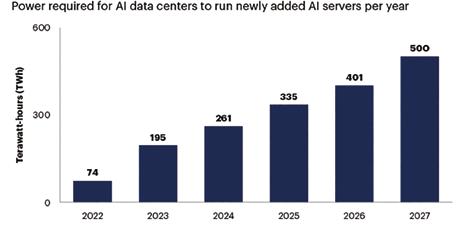
Source: Gartner (November 2024)
meantime, the cost of power to operate data centers will increase significantly as operators use economic leverage to secure needed power. These costs will be passed on to AI/GenAI product and service providers as well.”
Gartner recommends organizations evaluate future plans anticipating higher power costs and negotiate long-term contracts for data center services at reasonable rates for power. Organizations should also factor significant cost increases when developing plans for new products and services, while also looking for alternative approaches that require less power.
Zero-carbon sustainability goals will also be negatively affected by short-term solutions to provide more power, as surging demand is forcing suppliers to increase production by any means possible. In some cases, this means keeping fossil fuel plants that had been scheduled for retirement in operation beyond their scheduled shutdown.
Data centers require 24/7 power availability, which renewable power such as wind or solar cannot provide without some form of alternative supply during periods when not generating power, according to Gartner. Reliable 24/7 power can only be generated by either hydroelectric, fossil fuel or nuclear power plants. In the long-term, new technologies for improved battery storage (e.g sodium ion batteries) or clean power (e.g small nuclear reactors) will become available and help achieve sustainability goals.
Gartner recommends organizations re-evaluate sustainability goals relating to CO2 emissions in light of future data center requirements and power sources for the next few years. When developing GenAI applications, they should focus on using a minimum amount of computing power and look at the viability of other options such as edge computing and smaller language models.










